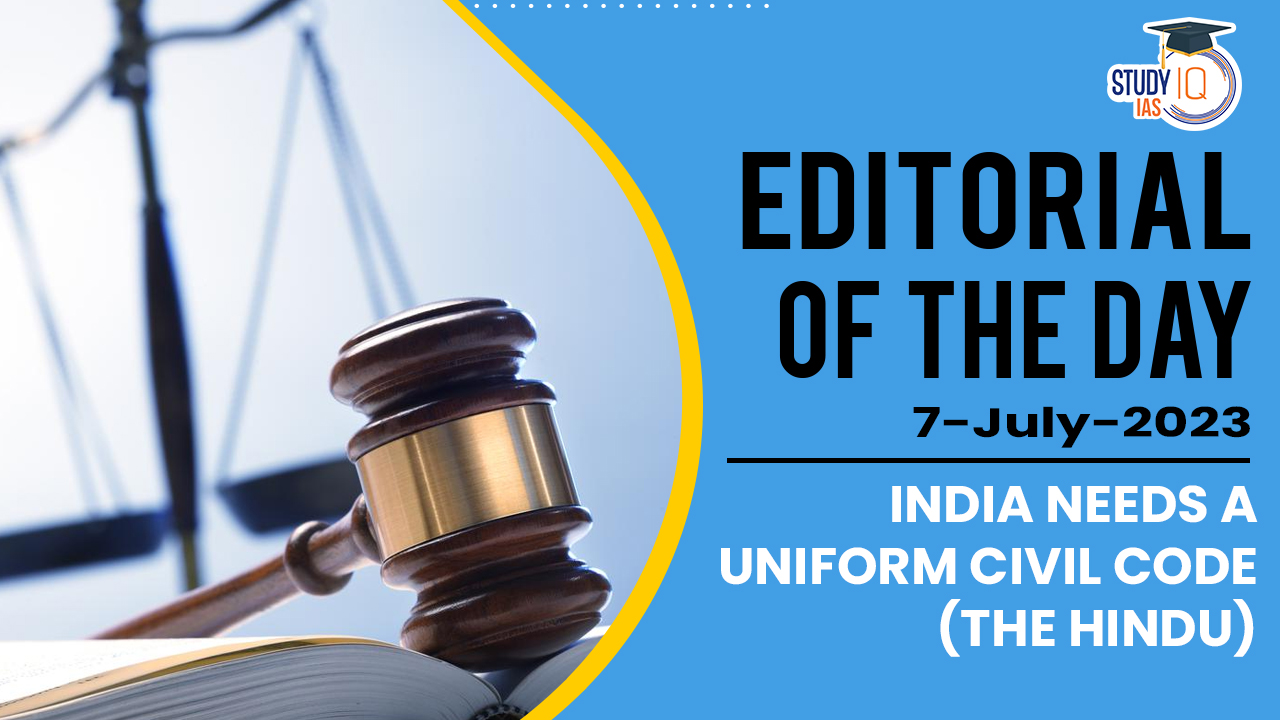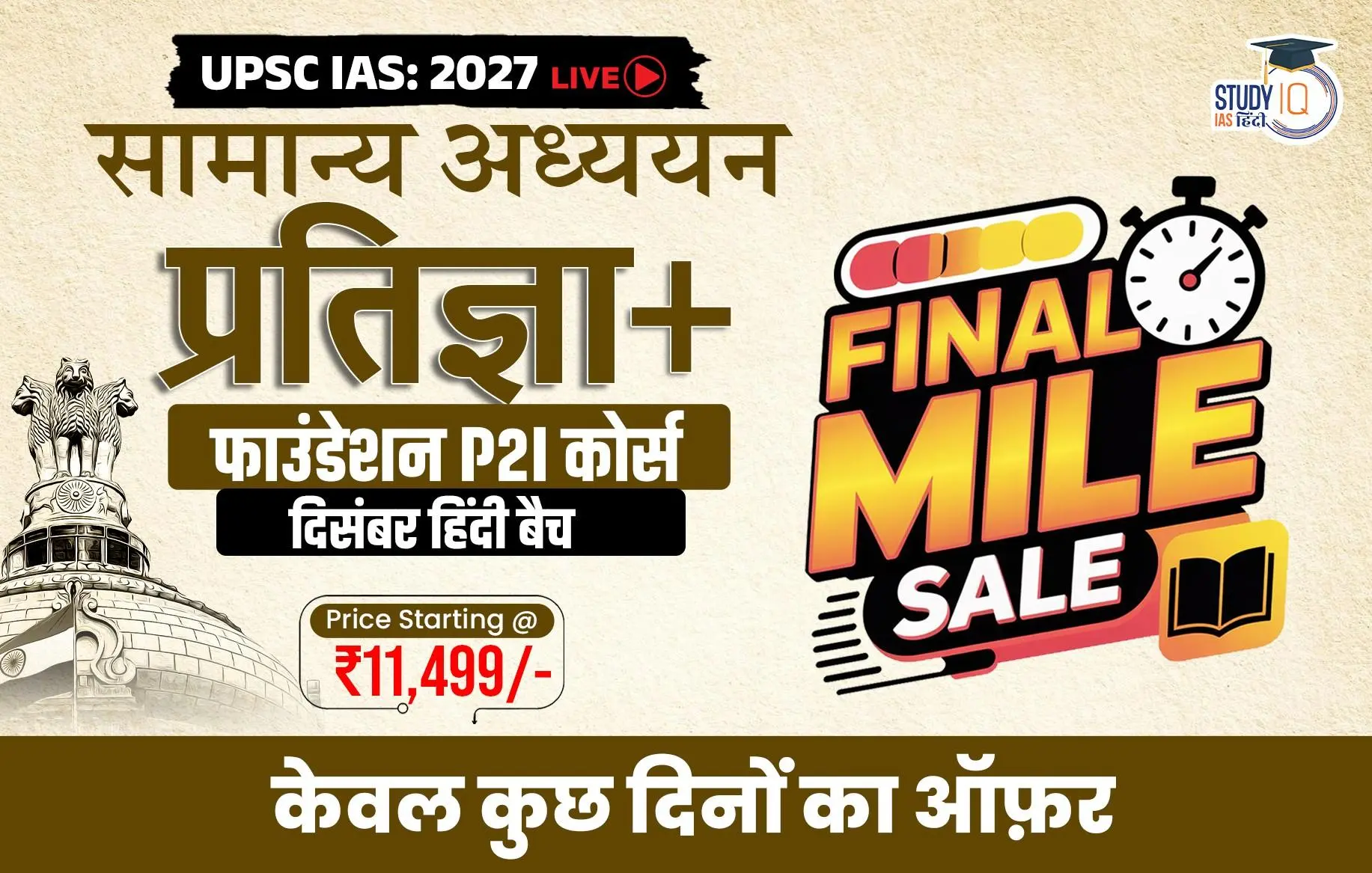Table of Contents
Context: The article is discussing the absence of a Uniform Civil Code (UCC) in India and its impact on the country’s progress towards social harmony, economic development, and gender justice. The Indian Government recently highlighted this issue and called for the enactment of a UCC for providing a common set of laws applicable to all citizens, irrespective of their religious background. The article suggests that the absence of a UCC has hindered the nation’s progress towards social harmony and development and thus suggests that by implementing a UCC, the intention is to create a more unified and equal legal framework for all citizens, fostering a sense of equality, consistency, and fairness.
Background
What is Uniform Civil Code (UCC)?
- The UCC is a proposed legal framework that aims to provide a common set of laws governing personal matters such as marriage, divorce, inheritance, and adoption for all citizens, regardless of their religion.
- The UCC is intended to replace the existing personal laws that are based on religious customs and traditions.
- Historical background of UCC:

- Constitutional provision on UCC:
- The Uniform civil code is mentioned in article 44 of the Indian constitution of 1950 as a directive principle of state policy (DPSP).
- Article 44 states that “The State shall endeavour to secure the citizens a Uniform Civil Code (UCC) throughout the territory of India.”
- Current state of UCC in India:
- At present, Goa is the only state in India with a uniform civil code.
- The Portuguese Civil Code of 1867 is applicable to all the people having their domicile in Goa. There is no uniform civil code in the rest of the country.
- Apart from the above the government has brought several legislations in line with the UCC such as the amendments to Hindu code bills (They provide uniformity in legal provisions to all religions who are not Muslim, Parsi, Jews, and Christians) and the Special Marriage Act, 1954 (It provides a form of civil marriage to any citizen irrespective of religion).
Need for UCC in India:
- Different religious communities in India are currently governed by different personal laws.
- For example, Hindu personal law is codified in “four Hindi code bills”: the Hindu Marriage Act, Hindu Succession Act, Hindu Minority and Guardianship Act, and Hindu Adoptions and Maintenance Act. The term ‘Hindu’ also includes Sikhs, Jains and Buddhists for the purpose of these laws.
- Certain aspects of Muslim personal law are expressly recognized in India in acts such as the Shariat Application Act and Dissolution of Muslim Marriages Act.
- Christian marriages and divorces are governed by the Indian Christian Marriages Act and the Indian Divorce Act, while Zoroastrians are subject to the Parsi Marriage and Divorce Act.
- This has led to the emergence of several social evils in the society, especially those adversely impacting the dignity of women.
- The women have fewer rights than the men under these laws. Also, the religious personal laws give birth to many taboos, for instance, patriarchy, early marriage, dowry, domestic violence etc.
- Thus, a uniform personal law will bring about uniformity and undo all the evils that have crept inside our existing personal laws.
The Judiciary on Uniform Civil Code (UCC)
- Shah Bano Case (1985): The Supreme Court held that Parliament should outline the contours of a common civil code as it is an instrument that facilitates national harmony and equality before law.
- Jordan Diengdeh case (1985): The court opined and observed for the reformation of law of marriages by having a uniform law applicable to all people irrespective of religion and caste.
- Sarla Mudgal Case (1995): The Supreme Court of India directed the Ministry of Law and Justice to reflect the steps taken and efforts made, by the Government of India, towards securing a “uniform civil code” for the citizens of India.
- John Vallamattom case (2003): The Supreme Court held “It is regrettable that Article 44 of the Constitution has not entered into force. A common civil code will help the cause of national integration by removing contradictions based on ideologies”.
Decoding the Editorial
India is a diverse nation with multiple religions, each having its own personal laws governing various aspects of life such as marriage, divorce, adoption, inheritance, and succession. These personal laws differ based on religious affiliations, creating inconsistencies and inequalities in the legal system. The absence of a UCC means that different religious communities follow their own distinct set of laws, which can lead to disparities and conflicts.
Evolution of UCC Debate:
- The debate on the Uniform Civil Code (UCC) in India can be traced back to the discussions held in the Constituent Assembly, which was responsible for drafting the Constitution of India.
- During these debates, Babasaheb Ambedkar, one of the key architects of the Constitution, strongly advocated for the implementation of a UCC.
- He emphasized that a UCC was crucial for ensuring gender equality and eliminating social injustices prevalent in society.
- Ambedkar argued against the notion that religion should have complete control over personal laws, stating that the purpose of having liberty was to reform the social system and address inequities that conflicted with fundamental rights.
- Other prominent members of the Constituent Assembly, such as Alladi Krishnaswamy Ayyar and K.M. Munshi also supported the idea of a UCC.
- They believed that a UCC would promote harmony and a common agreement on personal laws across the diverse population of India.
- However, due to the lack of consensus within the Constituent Assembly, the matter of a UCC was included in Article 44 of the Directive Principles of State Policy.
- Article 44 serves as a constitutional mandate, urging the state to enact a UCC that applies to all citizens, regardless of their religious beliefs or personal laws.
- The Supreme Court of India has also addressed the issue of a UCC on multiple occasions.
- In the landmark Shah Bano case, the court expressed regret that Article 44 had not been effectively implemented.
- The court recognized that a UCC would contribute to national integration and emphasised that the right to religious freedom should be exercised in accordance with the principles underlying fundamental rights.
- However, the court refrained from issuing a direct directive to the government, as the formulation of laws falls within the jurisdiction of the Parliament.
Significance of UCC:
- The UCC would safeguard the fundamental rights of all citizens and reduce social inequalities and gender discrimination.
- It would create a unified legal framework that upholds the principles enshrined in the Constitution and reaffirmed by Supreme Court judgments.
- Its overarching objective is to ensure that there is no gender discrimination, everyone enjoys the fundamental rights enshrined in the Constitution, and that the law of the land is uniform for every citizen in our country.
- It will serve as a powerful instrument for the promotion of equality and justice for all citizens.
- A UCC would eliminate discriminatory practices that deprive women of their rights and provide them with equal opportunities and protections.
- It would address the existing challenges and will bridge the gaps and promote a sense of unity among diverse communities.
Personal laws should have a two-dimensional acceptance — they should be constitutionally compliant and consistent with the norms of gender equality and the right to live with dignity. The Constitution is the North Star which guides us in this regard. It exemplifies the essential principles of justice, gender equality, and secularism which, taken together, set the foundation of the UCC.
Way Forward
- Public Awareness and Education: It is important to raise public awareness about the significance and benefits of a Uniform Civil Code. Conducting educational campaigns, seminars, and public discussions can help dispel misconceptions and foster understanding.
- Dialogue and Consultation: Engage in open and inclusive dialogue with religious leaders, representatives of various communities, and political parties. Seek their perspectives, address concerns, and work towards finding common ground.
- Legislative Process: The government should take the initiative to draft and introduce a comprehensive UCC bill in the Parliament. The bill should be well-researched, taking into consideration the diverse religious and cultural aspects of Indian society.
- Parliamentary Debate and Consensus-Building: Encourage a robust and respectful debate in the Parliament, allowing different viewpoints to be heard. Seek consensus through dialogue, negotiations, and amendments to ensure that the final UCC legislation reflects the aspirations of the nation.
- Judicial Review: If a UCC bill is enacted, it may face legal challenges. The Supreme Court can play a crucial role in reviewing the constitutionality of the legislation and providing guidance on its implementation.
- Social Acceptance and Implementation: Once the UCC becomes law, efforts should be made to promote its acceptance and implementation across the country. Public outreach programs, legal aid services, and awareness campaigns can help citizens understand their rights and responsibilities under the UCC.
- Regular Review and Amendment: As societal dynamics evolve, the UCC should be periodically reviewed to address emerging challenges and ensure its relevance and effectiveness. This can be done through regular assessments and amendment processes.
Beyond the Editorial
Arguments against UCC
- Practical difficulties due to diversity: India has a diverse culture which is spread across different religions, sects, caste, states etc. Thus, this diversity makes it difficult to implement a uniform set of laws on personal issues like marriage, divorce, inheritance and maintenance.
- Perception among minorities: A belief persists among minorities that Uniform Civil Code will neglect their traditions and impose rules which will be mainly influenced by the majority religious communities.
- For example, AIMPLB calls Uniform Civil Code unconstitutional, anti-minorities and has said it will oppose any attempt towards establishing Uniform civil code in India.
- Violation of Fundamental rights: A UCC is seen, by many, as a contradiction to the fundamental rights guaranteed under Article 25 (individual’s fundamental right to religion), Article 26(b) (right of each religious denomination to “manage its own affairs in matters of religion), and Article 29 (right to conserve distinctive culture).
- Issues with drafting of UCC: The implementation of Uniform Civil Code is a very demanding task as it will bring many changes like adopting expansive interpretations on marriage, maintenance, adoption and succession. The task is very demanding and the government would need to be sensitive and unbiased while dealing with the minority and majority communities, otherwise it would turn out to be more disastrous and can lead to riots and communal violence.
- Not supported by Law commission: In 2018, the 21st Law Commission in a consultation paper held that UCC is neither necessary nor desirable at this stage. Rather it suggested the codification of all personal laws so that prejudices and stereotypes in every one of them would come to light and could be tested on the anvil of fundamental rights of the Constitution.
- No uniformity even in civil laws relating to non-religious matters: Indian laws do follow a uniform code in most civil matters – Indian Contract Act, Civil Procedure Code, Sale of Goods Act, Transfer of Property Act, Partnership Act, Evidence Act etc. States, however, have made hundreds of amendments and therefore in certain matters, there is diversity even under these civil laws.


 Protection of the Aravalli Range: Import...
Protection of the Aravalli Range: Import...
 Viksit Bharat Shiksha Adhishthan Bill 20...
Viksit Bharat Shiksha Adhishthan Bill 20...
 India’s Biosecurity Framework for Emer...
India’s Biosecurity Framework for Emer...

























